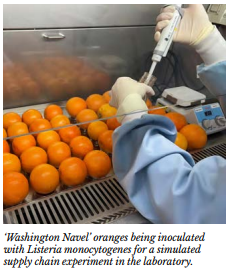21 January 2022
Improving food safety practices to safeguard exports
Improving food safety practices to safeguard exports
13/01/2021
A new project focused on food safety in citrus aims to mitigate microbial food safety risks associated with the production, postharvest handling and supply of citrus to consumers in domestic and export markets.
The project will be led by Dr SP Singh and the NSW DPI.
The Australian citrus industry exports oranges and mandarins worth half a billion dollars to the major Asian markets. The success of citrus export is built on the free trade agreements and a clean, green, and safe reputation of the industry.
“‘Healthy, nutritious and safe’ is the unique selling point that the Australian citrus industry promotes in its marketing campaigns,” Dr Singh said.
“However, the industry needs to be proactive in maintaining the confidence of consumers, regulators and trading partners in the quality and safety of their fruit to ensure the market access is retained, and new markets are created.
“To remain competitive in the export markets it is imperative that the Australian citrus industry has the capacity to consistently supply safe and nutritious fruit.
“Due to the inedible peel, citrus fruit presents a relatively lower microbial food safety risk to consumers.
“However, any detection of microbial contaminants on the fruit poses a potential ‘trade risk’ and could trigger a non-tariff barrier. Given the current volatility in export markets due to various geopolitical reasons, this risk is significant.”
Dr Singh and his team will engage with citrus growers and packers in all major production regions to collect data and information relating to the current industry practices on food safety.
This information will deliver a national snapshot of the industry practice and identify potential gaps to be addressed in the short-, medium- and long-term.
The project will follow a whole-of the-chain approach with strong stakeholder engagement to verify food safety practices and detect potential hotspots for microbial contamination and cross-contamination along the supply chain.
Each link within the supply chain will be examined, starting with field production, postharvest processing and distribution through to retail.
With the voluntary participation of citrus growers and packers, fruit and environmental samples will be collected from all primary production and supply regions to detect the target foodborne bacterial pathogens.
“I encourage citrus growers and packers to contact me to confidentially discuss their food safety practices and participate in the project to ensure the robust preventative control measures are in place to minimise the food safety risks to consumers and industry,” Dr Singh said.

Dr Singh said there are some unanswered questions on the ability of foodborne bacterial pathogens to survive and multiply during the cold treatment for phytosanitary purposes and other supply chain scenarios in export and domestic markets.
The project will investigate the survival and persistence of the key foodborne bacterial pathogens (e.g. Salmonella and Listeria monocytogenes) on various types and varieties of citrus fruit under simulated supply chain conditions.
The influence of critical postharvest conditions (e.g. storage temperature, cold phytosanitary treatment and shelf-life) affecting the pathogen survival will be investigated.
“The experimental data and industry’s food safety practice information will form the basis for developing a scientific evidence-based Best Practice Guide for the industry to understand and manage these risks effectively,” Dr Singh said.
The information pack and Best Practice guidance will be delivered through various channels of communication such as workshops, forums, meetings and industry magazines to enhance the skills and knowledge of growers, packers and the key staff involved in the supply chain.
“The outcomes of this project will enhance the industry’s food safety capacity and influence the practice to mitigate microbial food safety risks.”
More information
This article is a contribution from the project ‘Managing microbial food safety risks in the Australian Citrus Industry (CT20005)’. You can contact Dr SP Singh on 0420 593 129 or email sp.singh@dpi.nsw.gov.au

Membership
You are not logged in
If you are not already a member, please show your support and join Citrus Australia today. Collectively we can make big things happen.
